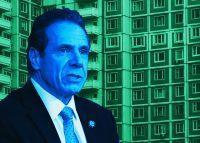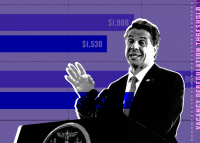Two Manhattan politicians are calling for measures to give renters and landlords a respite.
Assembly member Harvey Epstein proposed a bill Tuesday that would cancel this year’s Rent Guidelines Board rent increases and freeze rents on rent-regulated apartments until next June.
Separately, Manhattan Borough President Gale Brewer and her Brooklyn counterpart Eric Adams, along with two City Council members, called on landlords to let tenants use their security deposits to pay rent.
“Right now we’re in a pandemic — a global crisis,” said Epstein. “The idea that we should have Rent Guidelines Board meetings makes zero sense. The impact of raising rents makes zero sense.” The board determines base-rent increases for the city’s more than 900,000 rent-stabilized apartments.
The legislation would keep rents at their current level until next summer.
In New York City, the board holds public meetings ahead of a June vote to set the allowable increases for the city’s nearly one million rent-regulated apartments. The yearly event usually sets the stage for raucous protests from tenants opposing any increase, while landlords fire off press releases claiming their expenses have been outstripping rent hikes for years.
Many in the real estate industry had hoped that after the tenant-friendly rent reforms last year, the annual increases allowed this year would be more generous than what the board approved: 1.5 percent for one-year leases and 2.5 percent for two-year leases.
Epstein’s bill would wipe out those increases.
Brewer, Adams and the other elected officials called on landlords to offer their own remedy for cash-strapped tenants. Landlords, they say, should let tenants use their security deposit funds to pay rent if they are experiencing financial hardship during the crisis.
The politicians asked landlords to give tenants the option to pay back the deposit at the end of the month or purchase a low-cost insurance program to protect landlords when tenants damage their apartments or move out with rent still due. The measure’s backers said it would unlock about $8 billion in untapped savings, and $45 billion if it were scaled nationally.
“Even as the city looks to the federal and state governments for direct support, we need to tap into every available resource to sustain our renters,” said Brewer in a statement. “Releasing $8 billion of security deposits has become a necessity under current circumstances. I join my colleagues in government to call for rent relief for tenants while ensuring building services can continue.”
But neither of the measures would solve the conundrum that New York’s rental housing market is facing: Sweeping layoffs will render many tenants unable to pay rent, and in turn, their landlords may be unable to pay their lenders.
Joseph Strasburg, president of the landlord group Rent Stabilization Association, compared the deposit-access measure to “putting a Band-Aid on a severed artery” and added that “when the smoke clears, there needs to be a mechanism to replace used-up security deposits for both tenant and landlord protection.”
Strasburg said dipping into deposits to cover rent might be tempting for landlords “facing unprecedented cash-flow problems” but he urged them to resist doing so.
Gov. Andrew Cuomo acted swiftly to provide relief to homeowners, but many renters are now unable to earn money with the hospitality industry cratering and non-essential workplaces closed by the governor’s order. Landlords are now frantically searching for options to fend off financial ruin, while banks push for a direct subsidy to renters so the institutions’ assets do not become distressed, according to sources.
Cuomo said he “took care of the rent issue” — a reference to a stay on evictions — but has put no policy in place to financially assist landlords or renters.
Read more of our coverage on housing policy amid the global health crisis







